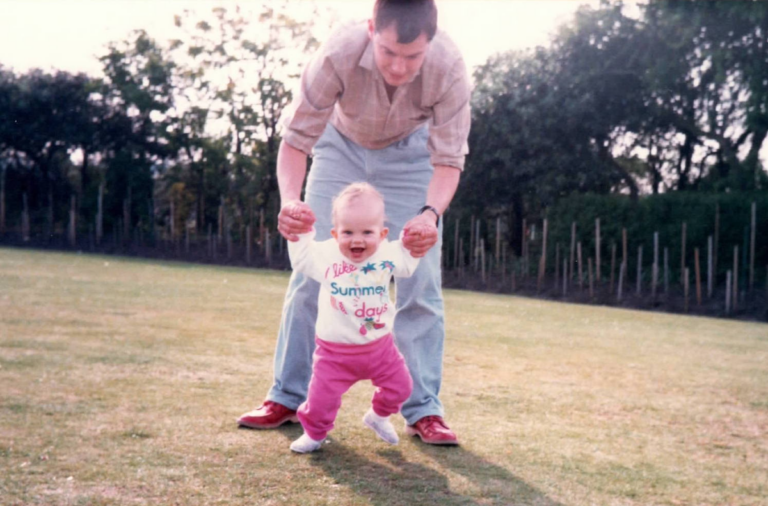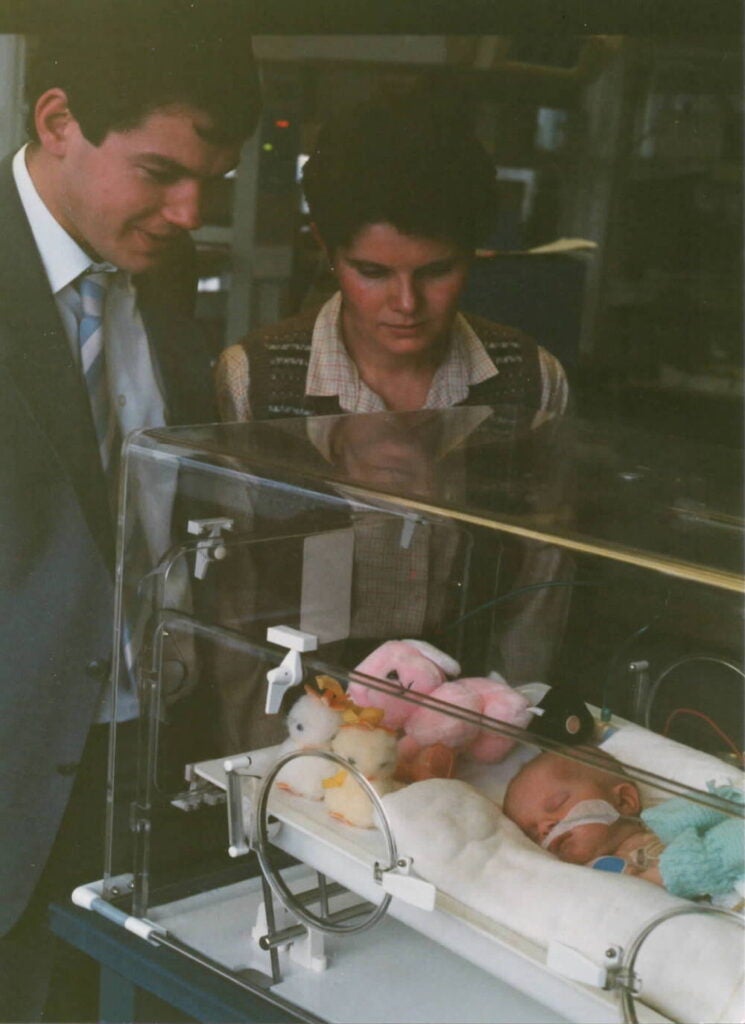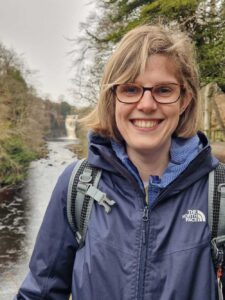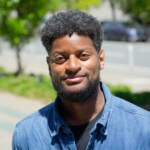A shocking secret, years of denial, and reconciling one’s identity: Sophie Ottaway shares her story
About 16 years ago, Sophie Ottaway made a shocking discovery about her identity – she was born a male. The truth brought on years of denial, feelings of betrayal, and trauma.
Listen 11:07
Sophie Ottaway and her father John Ottaway playing outside. (Courtesy of Sophie Ottaway)
This story is from The Pulse, a weekly health and science podcast.
Find it on Apple Podcasts, Spotify, or wherever you get your podcasts.
Growing up near Manchester, England, Sophie Ottaway was always having to go to the doctor. She was aware that she had been born with a complicated health condition.
“The first memory I’ve got really as a conscious young adult was around about the age of 11 when I first started having to see the endocrinologist,” she said.
Her mother would typically accompany her to most of these appointments. She hated going to see her doctor to begin with.
“Because none of my friends were going on these visits — I wised up to that quite quickly. I realized my school friends didn’t have to go every six months to see this weird man,” she said.
Sophie was 22 years old and dealing with a lingering case of tonsillitis in 2008. She went to see a general practitioner to get it checked out with her mother by her side.
After waiting a while in the exam room, her doctor finally walked in, pulled up the computer screen, and Sophie noticed something on her medical notes that would change her life forever.
On the monitor, she saw “46 XY chromosomes … prolapsed bowels through abdominal defect … bladder reconstruction, testes and phallus removed…vaginal construction.”
“At that age, at 22 I was old enough to understand that an XY chromosome was a male chromosome,” she said.
But this was on her chart. She was seeing an unimaginable truth — she was born a male.
Just the thought sent her mind reeling. She remembers being frozen in a state of shock.
“My initial reaction was absolutely anger. I didn’t say anything. I kept my composure.”
Sophie traded glances with her mother.
“My mum looked at me with this knowing one look, and I looked at her as much to say, ‘Yeah. Yeah. You know, I know.’”
When the appointment was over, Sophie remembers getting into the car, and they didn’t say much to each other. But when they got home – things took an explosive turn.
“I just lost it — like absolutely lost it. I kind of wanted answers. Like, ‘why didn’t you tell me? Why did you keep this from me? You know, what does this mean for my future? What else don’t you know?’” Sophie said. “Because I guess once you work out one aspect of your life is a lie, you start to question quite a lot of things at that point, because if you can keep a secret that big on, what else can you be keeping?”
Subscribe to The Pulse
And her mother did everything to explain what had happened.
“She was thinking on her feet, and she was just endlessly talking with love and with care because my mom never intended anything bad to happen to me. I’m a hundred percent certain of that.”
Sophie was overwrought with emotions. When they got home, she immediately went to their fridge and snatched a bottle of beer. Then she stormed upstairs to her room — slamming the door shut.
She spent a lot of time in her bedroom collecting her thoughts. And then she came to one conclusion – to bury her pain in the “depths of despair.”
“At the time, I was in second year at university, and I think the next day I took off, but then the day after that it was all forgotten and we [family] all just had to carry on with our lives like nothing had really happened,” she said. “For many, many years our family did not talk about it. And I went into just denial. I knew that if I was to take in what I read on that screen that it was like a fast track to suicide. I just knew I couldn’t handle that at that age and with my mental capacity and without any support.”
Born with a rare condition
Sophie was born on March 20, 1986. She weighed just over 5.5 pounds. She was a first-born child. Her father worked as an IT analyst, and her mother worked in housekeeping, but had been a lab assistant prior. They had wanted to have children for quite some time.

A couple of months before Sophie’s birth, her mother went in for a final ultrasound and everything seemed normal. But after the delivery, doctors noticed a serious deformity in Sophie’s abdominal region. Her bladder and intestines were protruding outside of her body — both organs were almost split in half — as were her male genitals.
The official diagnosis was cloacal exstrophy. It’s an uncommon condition rarely seen in the medical field.
Doctors told her parents that without surgery, Sophie’s condition would lead to many other problems. Frequent hospitalizations, risk of infectious disease, erectile dysfunction, missed school days — the picture was frightening.
The surgeons also told the parents that an operation to reposition the baby’s organs and intestines back in place was the best solution. As for the split genitals — surgeons decided to remove them altogether.
“In those days, they’re stuck in this hospital,” Sophie said. “There’s no such thing really as the internet back then and these men in the white coats were the only ones that offered any advice. They seemed confident in what they were going to do. They’d made out they’d done it before.”
Sophie’s parents agreed to the surgery, which lasted over 10 hours.
The doctors also recommended that the parents should change the baby’s gender from male to female – so they checked off female on the birth certificate.
A hospital consultant recommended that they not tell anyone about Sophie’s true identity. Not to friends, not to family — and especially not to Sophie.
So, when Sophie learned the truth about her identity by accident in 2008, she says there was a moment of,
“‘Ah well, my entire life makes sense now’ — like, not in a good way. But … I’d always felt like there was many missing pieces to the jigsaw puzzle and I never felt that someone was hiding things from me, I just kind of thought maybe that’s just what life is,” she said. “But on that moment, everything became clear.”
‘No reason to believe that I wasn’t just a slightly odd female’
She remembers her childhood as mostly wonderful. She was a vibrant, cheerful, curious and outdoorsy little girl. Enjoying everything from playing soccer, rollerblading and climbing trees. There were some medical complications that she was aware of — like having occasional bladder problems.
She also says she was an “androgynous child.”
“If you see any pictures of me, I look like this bloody awful pixie. My mom used to put me these awful green leggings,” Sophie said.
Reflecting back, Sophie says there were many signs about her true identity. Beginning with taking hormones at age 11. She was told it was because her ovaries had been damaged and removed at birth. Up to this point, she thought she was nothing more than a “tomboy.”
“I was not into hair and makeup and all this kind of stuff – watching romantic movies,” she said. “I had no interest in all of that stuff.”
By the age of 13 or 14, her jovial personality morphed into an angsty teenager with a bleak view of life. She struggled with her body image. Looking back, she mostly blames that on the hormones.
“I was so tired all the time,” she said. “I never wanted to exercise, I was spotty – like imagine a fat spotty teenager, but depressed. My interest in being outside and hanging out on the push bike or the skateboard that all went, and it was all me in my bedroom with my Hi-Fi system listening to Slipknot, Korn, Limp Bizkit and Papa Roach. You know, let’s all hate the world. The world is an ugly place, kind of narrative.”
When it came to dating, Sophie didn’t have much interest in boys and getting close to someone was very difficult.
“I didn’t really go for people that I thought that I liked. I think I started to go for people that I thought were really sympathetic,” said Sophie. ”So I ended up in like lots of kind of strange relationships … I think almost just looking for validation or just looking for someone to say, ‘Oh, it’s alright. I accept you,’” she said.
Sophie began struggling through years of addiction after discovering that she was born a male.
“All I wanted to do was blot out the pain,” she said. “I always like to drink, but socially. But my drinking went through the roof. And, then I spent quite a lot of years having problems with cocaine and various sorts of drugs.”
Self-medicating became her go-to recourse to avoid even more self-harm. And she spent years in denial about the truth she had learned in the doctor’s office in 2008.
During those years, most of her romantic relationships were with women. But she kept a lot of herself hidden. Which she now wishes she could take back.
“I have many, many regrets about relationships that I was in with women where I knew my birth gender, but I never told them it because I hadn’t told another soul. – I couldn’t admit it to myself that that were truth,” she said.
But within the last few years, Sophie has spent a lot of time trying to put the puzzle pieces back together and make peace with her identity.
Now, 38 years old, after several interventions, Sophie has been sober from drugs and alcohol.

She still isn’t fully comfortable in her own body but has chosen not to undergo any other surgeries.
“I’m just happy presenting as I am now because the thing that matters is the soul that’s on the inside,” Sophie said. “I honestly believe we’re like a soul in a human vessel here for an experience. And yeah, it’s nice if we can get that vessel to look as though it makes us feel comfortable. But to what end do you go to do that?”
She’s also sharing her story with others – and realizing that she’s not as alone as she once felt.
“I’ve had lots of people contact me … with their traumatic stories in similar vein. So there’s been lots of stories of intersex people that were never told they were born intersex. The doctors made the wrong sort of choice of gender inclination and they’ve changed gender later on,” she said.
And recently, Sophie was able to track down the doctor who performed the surgery on her when she was a baby. She said they had a long talk.
“It was not an easy talk, but they’re sort of argument was, and it’s really a chauvinistic, sort of old school over sexualized view, which is if that penis could never have been functioning, then you’re not a useful sexual adult. Therefore, we might as well, you know make you into a useful sexual adult.
She also reconciled her relationship with her parents — which she says was a real turning point.
“We’re through the other side of it now. We’ve worked together,” Sophie said. “I’m really close with my family. I love my mum and dad to pieces.”
WHYY is your source for fact-based, in-depth journalism and information. As a nonprofit organization, we rely on financial support from readers like you. Please give today.







